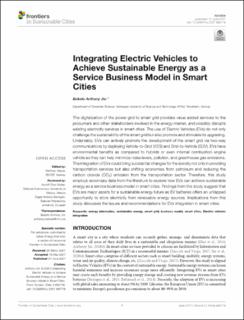Integrating Electric Vehicles to Achieve Sustainable Energy as a Service Business Model in Smart Cities
Peer reviewed, Journal article
Published version

Åpne
Permanent lenke
https://hdl.handle.net/11250/2825335Utgivelsesdato
2021Metadata
Vis full innførselSamlinger
Sammendrag
The digitalization of the power grid to smart grid provides value added services to the prosumers and other stakeholders involved in the energy market, and possibly disrupts existing electricity services in smart cities. The use of Electric Vehicles (EVs) do not only challenge the sustainability of the smart grid but also promote and stimulate its upgrading. Undeniably, EVs can actively promote the development of the smart grid via two-way communications by deploying Vehicle-to-Grid (V2G) and Grid-to-Vehicle (G2V). EVs have environmental benefits as compared to hybrids or even internal combustion engine vehicle as they can help minimize noise levels, pollution, and greenhouse gas emissions. The integration of EVs could bring substantial changes for the society not only in providing transportation services but also shifting economies from petroleum and reducing the carbon dioxide (CO2) emission from the transportation sector. Therefore, this study employs secondary data from the literature to explore how EVs can achieve sustainable energy as a service business model in smart cities. Findings from this study suggest that EVs are major assets for a sustainable energy future as EV batteries offers an untapped opportunity to store electricity from renewable energy sources. Implications from this study discusses the issues and recommendations for EVs integration in smart cities.
